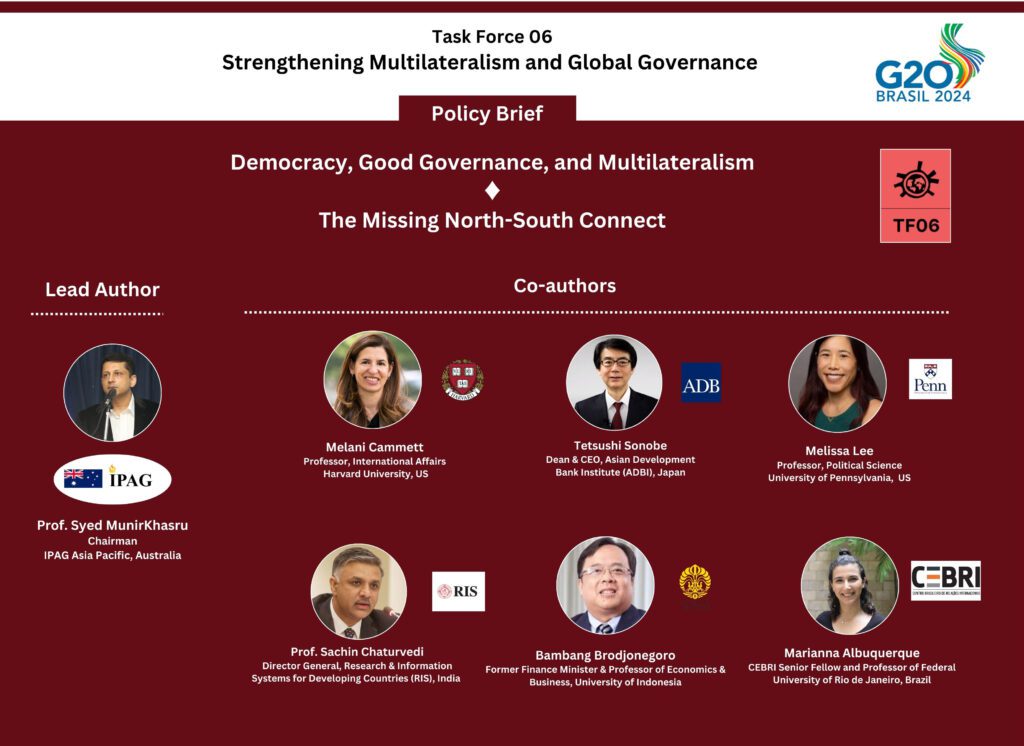Lead Author: Prof. Syed Munir Khasru, Chairman, IPAG Asia Pacific, Australia
Co-authors:
- Melani Cammett, Professor, International Affairs, Harvard University, US
- Prof. Tetsushi Sonobe, Dean and CEO, Asian Development Bank Institute (ADBI), Tokyo, Japan
- Melissa Lee, Professor, Political Science, University of Pennsylvania, US
- Prof. Sachin Chaturvedi, Director General, Research & Information Systems for Developing Countries (RIS), India
- Bambang Brodjonegoro, Former Finance Minister & Professor of Economics & Business, University of Indonesia
- Marianna Albuquerque, CEBRI Senior Fellow & Professor of Federal University of Rio de Janeiro, Brazil
___________________________________________________________
Abstract
While the principles of democracy, good governance, and multilateralism underpin international order, a disconnect exists between G7 countries/ former colonial powers (North) and developing countries of the South. This brief would argue that the “one sizefits-all” approach by the North is often counterproductive, exacerbating socio economic and political instability in the South. It would examine the intricate dynamics surrounding democracy, good governance, and multilateralism, with a focus on challenges imposed by Western-centric models. Undue influence exerted by these global actors has resulted in adverse socio-economic and political consequences in the Global South.
North’s promotion of democracy and good governance through conditionalities attached to aid and trade agreements is perceived as interference and imposition of alien values. The brief would shed light on the resulting resentment and resistance and negative impacts on the socio-economic fabric and political stability of developing countries. It would elucidate how the top-down approach has hindered local autonomy, stifled indigenous models of governance, and increased social unrest.
In light of these challenges, the policy brief would make recommendations for a collaborative approach to democracy and governance. It would advocate a genuine North-South connection, respecting socio-cultural diversity and ensuring participation of all stakeholders – the absence of which had hurt multilateralism in the past decades. The brief will outline strategies for G20 in promoting a harmonious North-South relationship in the realm of democracy and governance that can help reboot multilateralism in the post pandemic era. The twenty most powerful countries in G20 from both the developed North and developing South are ideally suited to lead the world for a new era of multilateralism boosted by principles of democracy and governance that are pragmatic as well as cohesive.
Diagnosis of the issue
1. Disparities in governance models
Multilateralism, succinctly defined, denotes the involvement of multiple parties. However, when evaluating multilateralism as a conceptual framework rather than a mere lexical entry, its quantitative dimension is often accompanied by a qualitative component. Multilateral institutions are expected not only to convene diverse parties but also to institute processes founded on effective inclusivity and diversity — values commonly associated with the “democratization” of international relations. Nevertheless, the realization of these ideals diverges from theoretical expectations. The contemporary multilateral mechanisms of global scope, such as the United Nations and the Bretton Woods institutions, emerged within specific historical contexts and power dynamics. The evolving global landscape introduces new power poles, transboundary threats, and increased diversity in identity and ideology (Lima and Albuquerque, 2020). Consequently, we contend that the myriad challenges facing multilateral organizations stem from a crisis of legitimacy arising from the mismatch between the post-World War II Liberal-Western institutional framework and the demands of a rapidly transforming world.
- Impact of western-centric models
These multilateral institutions, therefore, are not structured to prioritize non-Western centric paradigms. This discrepancy is exacerbated by the enduring legacy of colonialism in its various forms. Economically, numerous instances demonstrate how externally imposed macroeconomic policies have deleterious effects on developing countries, leading to economic turmoil that undermines political stability and state-building efforts.
Security concerns further underscore these disparities, as evidenced by the calls from African nations for the withdrawal of UN peacekeeping operations. Countries like Mali, Sudan, and the Democratic Republic of the Congo have voiced adamant opposition to Security Council mandates, citing perceived impositions without a clear exit strategy.
In this context, the G20 emerges as a promising conduit for bridging these divides. By bringing together developed and developing nations, the group offers ample opportunities for the Global South to shape agendas and influence outcomes through consensual decision-making processes. Although not primarily responsible for reforming multilateral institutions, G20 countries have already recognized the intrinsic link between the crisis of multilateralism and the more strictly financial concerns. It is no surprise, therefore, that multilateralism reform has been at the forefront of the G20 agenda and the subject of several T20 papers.
2. Challenges in multilateralism
- Perceptions of interference
The perception of interference is often linked to the conditionalities attached to international aid and trade agreements, which are seen by recipient countries, especially in the Global South, as impositions on their sovereignty. These conditions are frequently tied to the implementation of specific policies or reforms that align with the donor’s interests or values, which may not necessarily reflect the local context or priorities of the recipient country. This can lead to a sense of external interference in domestic affairs, undermining the principle of national sovereignty.
For example, the European Union’s withholding of aid to Palestine until their school textbooks are changed is a case where conditional aid is perceived as an external imposition, deeply affecting the operations of Palestinian civil society organizations, and undermining their autonomy. The restrictions based on counter-terrorism clauses in grant agreements further complicate the situation, making it difficult for NGOs within the Occupied Palestinian Territories to access funding without adhering to stringent conditions that may not align with their operational realities or objectives.
- Effects on local autonomy and social unrest
Moreover, the economic and financial consequences of social unrest, which can be exacerbated by these impositions, are significant. IMF research indicates that major unrest events can lead to a 1 percentage point reduction in GDP six quarters after the event, with sharper contractions associated with unrest motivated by socioeconomic factors. The use of conditional aid and the imposition of external models can contribute to social unrest by exacerbating existing inequalities, undermining local governance structures, and fueling discontent among the population.
Addressing these challenges requires a nuanced understanding of the local context and a collaborative approach that respects the autonomy and priorities of the recipient countries. It involves moving away from a one-size-fits-all approach and towards more tailored strategies that consider the socio-cultural diversity and specific needs of each country. This would facilitate a more effective and respectful form of engagement that supports sustainable development and social cohesion, rather than undermining it.
Recommendations
1. Fostering genuine collaboration
Intergovernmental forums like G20 work well when topics are about global externalities, such as climate change mitigation and adaptation and pandemic prevention, as a Spaceship-Earth mindset or a sense of solidarity is called back. Discussions about global public goods like rule-based multilateral systems, however, are not always constructive. This is because superpowers might cut their contributions to such systems, arguing that they are benefitting less than the other countries. If this happens, middle powers should rise up to persuade superpowers.
An alternative approach to securing structured dialogues is to bring together a wide range of stakeholders including civil society organizations, indigenous groups, and the private sector from both the North and the South. These dialogues should aim to foster mutual understanding, share knowledge, and collectively identify challenges and opportunities. They should be designed to go beyond mere consultation, ensuring meaningful participation in decision-making processes. For instance, the G20’s engagement groups, such as the Civil 20 (C20), Business 20 (B20), and Think 20 (T20), could serve as models for such dialogues. Ensuring that these platforms are accessible, and representative of the Global South’s perspectives is crucial.
- Support for indigenous governance models
This involves recognizing and valuing the governance practices that are inherent to local communities and indigenous populations. Partnerships should be established to document these practices, understand their underpinnings, and explore how they can be integrated or coexist with more universal governance frameworks. This effort would require a respectful approach that sees these local and indigenous practices as valuable contributions to the global governance discourse, rather than mere anthropological curiosities. Case studies, such as the incorporation of Bhutan’s Gross National Happiness index into broader development frameworks, can illustrate how indigenous governance models can offer valuable insights and alternatives to traditional metrics of success.
2. Reforming multilateral institutions
- Inclusive decision-making mechanisms
To enhance the legitimacy and effectiveness of multilateral institutions, it’s essential to implement mechanisms that ensure the Global South’s representation. This could involve quota systems for leadership positions and decision-making bodies within institutions like the United Nations, World Bank, and IMF. Additionally, advisory panels that include voices from the Global South can provide valuable insights and perspectives that might otherwise be overlooked. One example could be the reform of the UN Security Council to include permanent representation from African, Latin American, and Southeast Asian countries, reflecting a more equitable global representation.
- Capacity building in diplomacy and governance
Establishing mentorship and training programs can enhance the diplomatic and governance capabilities of emerging leaders from the Global South. These programs should be designed to share best practices in diplomacy, governance, and public administration, tailored to the specific needs and contexts of participants. Collaborations between established diplomatic academies in the North and institutions in the South can facilitate such capacity building, alongside scholarships and exchange programs that enable promising leaders from the South to gain experience and exposure on global stages.
3. Promoting policy coherence and consistency
- Collaborative approach and policy alignment
The stark divide within the G20 nations, particularly between developed and developing countries, necessitates a collaborative strategy for equitable global development. Initially designed as a cooperative platform, the G20 now faces the challenge of developed nations hesitating to mentor emerging economies, deviating from its foundational principles. A glaring example of this divergence is seen in the substantial economic growth gap between India and the other G20 members. With India’s remarkable 8 percent growth last year, it is poised to surpass Japan and Germany, becoming the third largest global economy. The imperative for all G20 members is clear – a collective commitment to heightened economic growth steering the group toward the esteemed status of developed countries. Addressing these disparities effectively requires a strategic and comprehensive approach.
The aim here is to ensure that policies and requirements set by international organizations do not conflict or impose undue burdens on nations in the Global South. This involves a concerted effort to align policies across various multilateral platforms including the G20 and the agreements, ensuring they complement rather than contradict each other. For instance, trade policies set by the World Trade Organization (WTO) should be harmonized with development goals outlined by the United Nations Development Programme (UNDP) to ensure that trade facilitation does not undermine sustainable development efforts in the Global South.
- Forging a sustainable global governance framework: aligning policies and assessing impacts for inclusive development.
Firstly, paramount is the alignment of policies across international organizations to prevent conflicting requirements for Global South nations. This strategic alignment is crucial in establishing a cohesive global framework that promotes the development of all nations, irrespective of their economic status. Secondly, it is imperative to establish robust mechanisms for assessing the enduring impacts of international policies on governance structures in the Global South. This proactive measure ensures that well intentioned policies are not only effective but also sustainable, fostering positive and enduring impacts on the governance and socio-economic landscapes of developing nations over time. Such measures could take the form of independent evaluation bodies or partnerships with academic institutions and think tanks in the Global South, ensuring that assessments are grounded in local realities and expertise.
4. Enhancing transparency and accountability
- Establishing open data initiatives
The push for open data initiatives involves encouraging governments, especially in the Global South, to make their data publicly available in accessible formats. This enhances transparency by allowing citizens, civil society, and international partners to access information on government activities, budget allocations, and policy outcomes. Initiatives like the Open Government Partnership (OGP) can serve as models, providing frameworks and support for governments looking to increase transparency through open data. Implementing such initiatives may require technical and financial support for countries in the Global South, ensuring they have the necessary infrastructure and capabilities to collect, manage, and disseminate data effectively.
- Strengthening civil society
Supporting the development and capacity building of non-governmental organizations (NGOs) and civil society organizations (CSOs) is crucial for fostering a vibrant civil society that can hold governments to account. This involves not only financial support but also technical assistance in areas like advocacy, legal expertise, and organizational management. International partners can facilitate knowledge exchange programs, provide platforms for civil society engagement at international forums, and protect civil society actors from repression and censorship. Strengthening civil society also means ensuring that these organizations can operate freely and safely, advocating for policies that reflect the needs and aspirations of their communities.
Scenario of outcomes
1. Enhanced global cooperation.
The adoption of G20 initiatives aimed at sustainable and inclusive growth, particularly in the context of climate change, has already shown promising results. G20 economies have been urged to invest an additional $35 trillion this decade to reach net-zero greenhouse gas emissions by 2050. This considerable investment is vital for transitioning to a low-emissions economy and requires upfront costs to transform the world’s energy and land-use systems. The global average of CO2 emissions per capita has returned to 2010 levels, illustrating tangible outcomes from global decarbonization efforts. Economic growth and business-led innovation are identified as crucial drivers for closing the G20’s empowerment and net-zero gaps, with growth playing a central role in boosting inclusion and addressing the net-zero gap by creating additional financing capacity and making low-emissions alternatives more cost-competitive.
2. Economic and social development
The Secretary-General of the United Nations highlighted the G20’s crucial role in addressing climate change, sustainable development, the worldwide food and energy crises, and digital transformation. The proposed Climate Solidarity Pact aims to combine resources and capacities of developed and emerging economies to benefit everyone on the planet, supporting emerging economies in accelerating their transition to renewable energy, thereby helping end dependence on fossil fuels.
Efforts to improve the bankability of infrastructure projects through non-regulatory micro-level interventions, such as improved information sharing and early-project approaches, can significantly enhance the scalability of projects and attract private investors. The G20 has developed tools for coordination related to infrastructure investment, including the Global Infrastructure Project Pipeline, to integrate national and multilateral databases of investment opportunities. Such initiatives are essential for driving scale and competition in opportunities for private finance and delivering on the ‘billions to trillions’ ambition laid out by Multilateral Development Banks (MDBs).
Challenges and trade-offs:
- National vs. global interests
The tension between national sovereignty and global obligations is a central theme in the discourse on global governance. This tension is particularly evident in the dynamics of international groups like the G7 and G20, which aim to address global issues but often face criticism for not being inclusive or effective in solving problems due to a focus on preserving the status quo rather than seeking urgent solutions. The reluctance of nations to confer certain aspects of sovereign prerogative to supranational institutions stems from a desire to safeguard national interests, despite the acknowledgment of interdependence necessitating greater international cooperation
b. Governance evolution
The evolution of governance models is crucial in navigating the complexities of modern global challenges. Traditional governance structures are being tested by the need for international cooperation in areas such as security, environmental governance, and economic integration. The principle of state sovereignty, established with the Westphalian system, continues to influence international relations, but there is a growing acknowledgment that solutions to global problems will require collaboration across various stakeholder groups, beyond just the representatives of national governments.
3. Sustainability and environmental impact
- Green governance initiatives
Green governance initiatives have been increasingly recognized for their potential to address climate and air pollution simultaneously. A notable example is the synergistic approach taken by countries like China, where air pollution and climate policies have driven significant climate ambition, delivering both immediate air quality benefits and long-term economic advantages. This model of co-governance, which integrates environmental, development, and climate policies across different levels of government, has shown to be cost-effective and beneficial in terms of achieving greater economic, social, and environmental outcomes. The success of such initiatives in countries across different stages of economic development underscores the universal applicability and effectiveness of collaborative environmental governance.
Resource management, on the other hand, is crucial for global sustainability and requires a cooperative approach to ensure the efficient use of natural resources. Joint stewardship of resources involves countries and stakeholders working together to manage resources sustainably, taking into account the environmental, economic, and social implications. This includes practices like sustainable fishing, water conservation, and the sustainable use of forests, which not only preserve biodiversity but also contribute to the well-being of communities and the global economy. The shift towards integrated and collaborative environmental policies and resource management strategies represents a significant step forward in achieving global sustainability.
Link: https://www.t20brasil.org/media/documentos/arquivos/TF06_ST_01__DemocracyJ_good_g67067aceb2ce4.pdf



